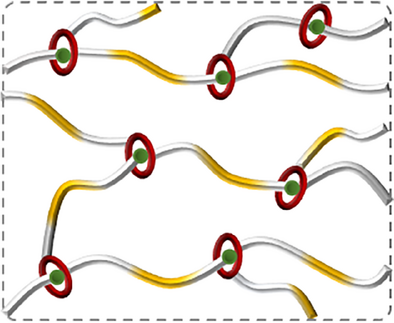Mechanically Tunable Slide-Ring Polymers via Photo-Regulated Topological Control
Xiaoqing Wang
Stoddart Institute of Molecular Science, Department of Chemistry, Zhejiang University, Hangzhou, 310058 China
Zhejiang-Israel Joint Laboratory of Self-Assembling Functional Materials, ZJU-Hangzhou Global Scientific and Technological Innovation Center, Zhejiang University, Hangzhou, 310058 China
Both authors contributed equally to this work.
Search for more papers by this authorChenjuan Yu
Stoddart Institute of Molecular Science, Department of Chemistry, Zhejiang University, Hangzhou, 310058 China
Both authors contributed equally to this work.
Search for more papers by this authorMaolin Wang
Stoddart Institute of Molecular Science, Department of Chemistry, Zhejiang University, Hangzhou, 310058 China
Search for more papers by this authorShiyu Zhao
Stoddart Institute of Molecular Science, Department of Chemistry, Zhejiang University, Hangzhou, 310058 China
Search for more papers by this authorQimo Mao
Stoddart Institute of Molecular Science, Department of Chemistry, Zhejiang University, Hangzhou, 310058 China
Search for more papers by this authorCorresponding Author
Prof. Yuping Wang
Stoddart Institute of Molecular Science, Department of Chemistry, Zhejiang University, Hangzhou, 310058 China
Zhejiang-Israel Joint Laboratory of Self-Assembling Functional Materials, ZJU-Hangzhou Global Scientific and Technological Innovation Center, Zhejiang University, Hangzhou, 310058 China
State Key Laboratory of Polymer Materials Engineering, Sichuan University, Chengdu, 610065 China
E-mail: [email protected]
Search for more papers by this authorXiaoqing Wang
Stoddart Institute of Molecular Science, Department of Chemistry, Zhejiang University, Hangzhou, 310058 China
Zhejiang-Israel Joint Laboratory of Self-Assembling Functional Materials, ZJU-Hangzhou Global Scientific and Technological Innovation Center, Zhejiang University, Hangzhou, 310058 China
Both authors contributed equally to this work.
Search for more papers by this authorChenjuan Yu
Stoddart Institute of Molecular Science, Department of Chemistry, Zhejiang University, Hangzhou, 310058 China
Both authors contributed equally to this work.
Search for more papers by this authorMaolin Wang
Stoddart Institute of Molecular Science, Department of Chemistry, Zhejiang University, Hangzhou, 310058 China
Search for more papers by this authorShiyu Zhao
Stoddart Institute of Molecular Science, Department of Chemistry, Zhejiang University, Hangzhou, 310058 China
Search for more papers by this authorQimo Mao
Stoddart Institute of Molecular Science, Department of Chemistry, Zhejiang University, Hangzhou, 310058 China
Search for more papers by this authorCorresponding Author
Prof. Yuping Wang
Stoddart Institute of Molecular Science, Department of Chemistry, Zhejiang University, Hangzhou, 310058 China
Zhejiang-Israel Joint Laboratory of Self-Assembling Functional Materials, ZJU-Hangzhou Global Scientific and Technological Innovation Center, Zhejiang University, Hangzhou, 310058 China
State Key Laboratory of Polymer Materials Engineering, Sichuan University, Chengdu, 610065 China
E-mail: [email protected]
Search for more papers by this authorGraphical Abstract
We developed light-responsive slide-ring polymer networks whose mechanical properties can be tuned through photoisomerization of the incorporated azobenzene units. The trans-state permits unhindered macrocycle sliding, yielding ductile materials, while UV-induced cis-configuration restricts macrocycle mobility to double Young's modulus. Furthermore, the azobenzene linkage confers controlled degradability under mild conditions.
Abstract
Post-synthetic dynamic control of polymer topology to modulate material properties on demand remains a grand challenge in polymer science. Here, we demonstrate a light-responsive slide-ring polymer network whose mechanical properties can be tuned through photoisomerization of incorporated azobenzene units. In the trans-state, azobenzene enables unhindered sliding of macrocycles along the polymer backbone, yielding a softer, more ductile material. UV-induced switching to the sterically demanding cis-configuration restricts ring mobility, thereby increasing the Young's modulus by two-fold while reducing toughness. Control experiments with noninterlocked analogs revealed the opposite mechanical response—light-induced softening—highlighting the pivotal role of topology in property regulation. Furthermore, the azobenzene linkage confers controlled degradability under mild conditions. This work establishes a versatile strategy for post-synthetic topological control via molecular photoswitches, enabling the design of adaptive polymers with stimuli-responsive mechanical properties for applications in smart materials.
Conflict of Interests
The authors declare no conflict of interest.
Open Research
Data Availability Statement
The data that support the findings of this study are available in the Supporting Information of this article.
Supporting Information
| Filename | Description |
|---|---|
| anie202511493-sup-0001-SuppMat.doc5.7 MB | Supporting Information |
Please note: The publisher is not responsible for the content or functionality of any supporting information supplied by the authors. Any queries (other than missing content) should be directed to the corresponding author for the article.
References
- 1Z. Lei, H. Chen, S. Huang, L. J. Wayment, Q. Xu, W. Zhang, Chem. Rev. 2024, 124, 7829–7906.
- 2N. J. V. Zee, R. Nicolay, Prog. Polym. Sci. 2020, 104, 101233.
- 3Y. Ren, X. Dong, Prog. Polym. Sci. 2024, 158, 101890.
- 4Y. Yang, M. W. Urban, Chem. Soc. Rev. 2013, 42, 7446.
- 5C.-H. Li, J.-L. Zuo, Adv. Mater. 2020, 32, 1903762.
- 6J. Kang, J. B. H. Tok, Z. Bao, Nat. Electron. 2019, 2, 144–150.
- 7H. Sun, C. P. Kabb, M. B. Sims, B. S. Sumerlin, Prog. Polym. Sci. 2019, 89, 61–75.
- 8F. Xu, B. L. Feringa, Adv. Mater. 2023, 35, 2204413.
- 9L.-J. Chen, H.-B. Yang, Acc. Chem. Res. 2018, 51, 2699–2710.
- 10Z. Zhang, J. Zhao, X. Yan, Acc. Chem. Res. 2024, 57, 992–1006.
- 11J. Zeng, L. Dong, W. Sha, L. Wei, X. Guo, Chem. Eng. J. 2020, 383, 123098.
- 12M. Wang, P. Zhang, M. Shamsi, J. L. Thelen, W. Qian, V. K. Truong, J. Ma, J. Hu, M. D. Dickey, Nat. Mater. 2022, 21, 359–365.
- 13S. J. D. Lugger, S. J. A. Houben, Y. Foelen, M. G. Debije, A. P. H. J. Schenning, D. J. Mulder, Chem. Rev. 2022, 122, 4946–4975.
- 14Y. Liu, L. Wang, L. Zhao, Y. Zhang, Z.-T. Li, F. Huang, Chem. Soc. Rev. 2024, 53, 1592–1623.
- 15B. Li, P.-F. Cao, T. Saito, A. P. Sokolov, Chem. Rev. 2023, 123, 701–735.
- 16L. Voorhaar, R. Hoogenboom, Chem. Soc. Rev. 2016, 45, 4013–4031.
- 17L. Yang, X. Tan, Z. Wang, X. Zhang, Chem. Rev. 2015, 115, 7196–7239.
- 18E. Khare, N. Holten-Andersen, M. J. Buehler, Nat. Rev. Mater. 2021, 6, 421–436.
- 19Q. Zhang, D.-H. Qu, B. L. Feringa, H. Tian, J. Am. Chem. Soc. 2022, 144, 2022–2033.
- 20J. Luo, Z. Demchuk, X. Zhao, T. Saito, M. Tian, A. P. Sokolov, P.-F. Cao, Matter 2022, 5, 1391–1422.
- 21S. Cho, S. Y. Hwang, D. X. Oh, J. Park, J. Mater. Chem. A 2021, 9, 14630–14655.
- 22C. R. Ratwani, A. R. Kamali, A. M. Abdelkader, Prog. Mater. Sci. 2023, 131, 101001.
- 23S. Yang, M. W. Urban, Nat. Rev. Mater. 2020, 5, 562–583.
- 24Z. Wang, X. Zheng, T. Ouchi, T. B. Kouznetsova, H. K. Beech, S. Av-Ron, T. Matsuda, B. H. Bowser, S. Wang, J. A. Johnson, J. A. Kalow, B. D. Olsen, J. P. Gong, M. Rubinstein, S. L. Craig, Science 2021, 374, 193–196.
- 25X. Li, W. Zou, W. Zhao, Y. Sun, A. Tang, S. Zhang, W. Niu, J. Am. Chem. Soc. 2025, 147, 4357–4364.
- 26K. Seshimo, H. Sakai, T. Watabe, D. Aoki, H. Sugita, K. Mikami, Y. Mao, A. Ishigami, S. Nishitsuji, T. Kurose, H. Ito, H. Otsuka, Angew. Chem. Int. Ed. 2021, 60, 8406–8409.
- 27Z. J. Wang, W. Li, X. Li, T. Nakajima, M. Rubinstein, J. P. Gong, Nat. Mater. 2025, 24, 607–614.
- 28Y. Xu, Y. Huang, J. Wang, S. Huang, H. Yang, Q. Li, Angew. Chem. Int. Ed. 2025, 64, e202423584.
- 29P. Shen, C. Zhang, E. Hu, Y. Gao, S. Qian, J. Zhang, Y, Wei, W. Heng, Eur. J. Pharm. Biopharm. 2023, 189, 56–67.
- 30Y. Okumura, K. Ito, Adv. Mater. 2001, 13, 485–487.
- 31S. Ando, K. Ito, Macromolecules 2025, 58, 2157–2177.
- 32K. Ito, Polym. J. 2007, 39, 489–499.
- 33T. Karino, Y. Okumura, C. M. Zhao, T. Kataoka, K. Ito, M. Shibayama, Macromolecules 2005, 38, 6161–6167.
- 34L. Chen, Y. Liu, W. You, J. Wang, Z. He, H. Mei, X. Yang, W. Yu, G. Li, F. Huang, Angew. Chem. Int. Ed. 2025, 64, e202423584.
- 35L. Jiang, C. Liu, K. Mayumi, K. Kato, H. Yokoyama, K. Ito, Chem. Mater. 2018, 30, 5013–5019.
- 36W. Wang, R. Bai, C. Wang, L. Yang, L. Cheng, Z. Zhang, W. Yu, X. Yan, Angew. Chem. Int. Ed. 2025, 64, e202507192.
- 37A. A. Gavrilov, I. I. Potemkin, Soft Matter 2018, 14, 5098–5105.
- 38C. Liu, H. Kadono, K. Mayumi, K. Kato, H. Yokoyama, K. Ito, ACS Macro Lett. 2017, 6, 1409–1413.
- 39L. Yang, Y. Wang, G. Liu, J. Zhao, L. Cheng, Z. Zhang, R. Bai, Y. Liu, M. Yang, W. Yu, X. Yan, Angew. Chem. Int. Ed. 2024, 63, e202410834.
- 40W. Y. Qin, C. Y. Shi, G. Q. Liu, H. Tian, D. H. Qu, Angew. Chem. Int. Ed. 2024, 63, e202423029.
- 41Y. Akae, J. Sawada, K. Nakajima, T. Takata, Angew. Chem. Int. Ed. 2023, 62, e202303341.
- 42J. Oh, G. Liu, H. Kim, J. E. Hertzog, N. Nitta, S. J. Rowan, Angew. Chem. Int. Ed. 2024, 63, e202411172.
- 43J. Sawada, D. Aoki, H. Otsuka, T. Takata, Angew. Chem. Int. Ed. 2019, 58, 2765–2768.
- 44C. Liu, N. Morimoto, L. Jiang, S. Kawahara, T. Noritomi, H. Yokoyama, K. Mayumi, K. Ito, Science 2021, 372, 1078–1081.
- 45S. Chen, Y. Wang, T. Nie, C. Bao, C. Wang, T. Xu, Q. Lin, D.-H. Qu, X. Gong, Y. Yang, L. Zhu, H. Tian, J. Am. Chem. Soc. 2018, 140, 17992–17998.
- 46C.-H. Wang, Y.-C. Lin, S. Bhunia, Y. Feng, P. Kundu, C. L. Stern, P.-L. Chen, J. F. Stoddart, M. Horie, J. Am. Chem. Soc. 2023, 145, 21378–21386.
- 47Y. Shi, Z. Yang, L. Xing, X. Zhang, X. Li, D. Zhang, Wold J. Microb. Biot. 2021, 37, 137.
- 48C. Shi, Q. Zhang, C.-Y. Yu, S.-J. Rao, S. Yang, H. Tian, D.-H. Qu, Adv. Mater. 2020, 32, 2000345.
- 49J. Deng, R. Bai, J. Zhao, G. Liu, Z. Zhang, W. You, W. Yu, X. Yan, Angew. Chem. Int. Ed. 2023, 62, e202309058.
- 50Y. Wang, L. Yang, L. Cheng, J. Zhao, R. Bai, W. Wang, S. Qu, Z. Zhang, W. Yu, X. Yan, Sci. China Chem. 2024, 67, 3414–3422.
- 51T. Ube, R. Nakayama, T. Ikeda, Macromolecules 2022, 55, 413–420.
- 52H. Zhou, C. Xue, P. Weis, Y. Suzuki, S. Huang, K. Koynov, G. K. Auernhammer, R. Berger, H. Butt, S. Wu, Nat. Chem. 2017, 9, 145–151.
- 53C. Zhang, Z. Zhang, X. Liu, Angew. Chem. Int. Ed. 2024, 63, e202411280.
- 54 Irradiated samples were exposed to ambient laboratory lighting for the monitoring of the recovery processes.
- 55A. Bu, Y. Zhao, H. Xiao, C.-H. Tung, L.-Z. Wu, H. Cong, Angew. Chem. Int. Ed. 2022, 61, e202209449.
- 56M. A. Pasha, H. M. Nanjundaswamy, Synth. Commun. 2005, 35, 897–900.





